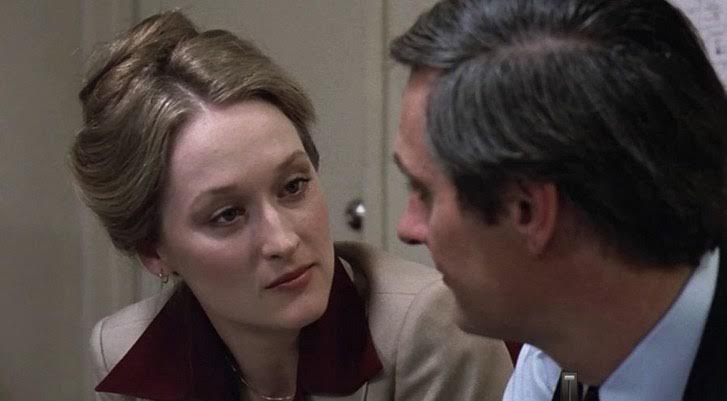Hi, we’re John and Matt and, icymi, we are watching every single live-action film starring Streep.

#4 — Karen Traynor, a Southern political operative who has an affair with a popular senator.
JOHN: I can’t even imagine what it must have felt like to be an actressexual in 1979, the year when Meryl Streep catapulted herself from that interesting, up-and-coming actress of The Deer Hunter, the Holocaust miniseries (which brought her first Emmy win), and the New York theater scene, to first-class movie star, appearing in three successful films and winning her first Oscar for the year’s highest-grosser and Best Picture champ, Kramer vs. Kramer. But let’s not get too ahead of ourselves; buried in the middle of all this impressive acclaim is perhaps Streep’s least-known triumph of her early period: Jerry Schatzberg’s The Seduction of Joe Tynan.
 This story of a liberal senator (Alan Alda, who also penned the script) struggling to balance political ambitions with family life, is a keen, sophisticated relic from a time when studio movies were risky, inspired, and targeted towards an adult audience, free of gimmicks or condescension. They were capable of making bank to boot.
This story of a liberal senator (Alan Alda, who also penned the script) struggling to balance political ambitions with family life, is a keen, sophisticated relic from a time when studio movies were risky, inspired, and targeted towards an adult audience, free of gimmicks or condescension. They were capable of making bank to boot.
In Joe Tynan, Streep plays Karen Traynor, a Louisiana lawyer who, while aiding Tynan’s campaign against a racist Supreme Court nominee (Remember when racism disqualified you from office?), begins a fling with Alda’s fast-rising political star...
Streep reportedly took this role as a distraction from the death of her lover John Cazale; production began just four weeks after the funeral. This circumstance lends, I think, an unexpected sadness to her performance, a melancholic undertow that underscores the frivolity of this brief affair. One of my favorite moments of her performance occurs when, after exchanging a first kiss with Joe in his office, Karen watches him take a call from his wife (the extraordinary Barbara Harris), and is subsequently reminded of her cursory status in Joe’s life. We see Streep, in close-up, play out the initial high of a new romance with the uncomfortable reminder of its impermanence.
Do you think of Karen as a melancholy character too, or am I reading too much into Streep’s own personal life? It’s not as if the performance is without that loose, relaxed, and undeniably comic sensibility that she excels at in so many of her “lighter” roles.
MATTHEW: Let me just say that what Streep does in those close-ups as Alda natters away on the phone is utterly hypnotic. Karen is wading through a sandstorm of emotions, from moony elation to sidelined discomfort, and watching Streep embark on this minutes-long emotional journey with the character is one of the first of Joe Tynan’s many acting pleasures. (Streep is excellent here, but I also cannot undersell the depths of feeling and peculiarity that Harris invests into her unusually rich Ambivalent Wife role; Harris was the National Society of Film Critics runner up for Best Supporting Actress of 1979, losing to Streep herself for all three of her 1979 films)
There is definitely a discernible sorrow to Streep’s performance that is perhaps best embodied in the indulgently extended, mid-film scene of Karen at home in Louisiana, one of the only moments in which we are allowed to witness Karen’s life away from Joe. We see Karen say a dispassionate, fleetingly-interested goodbye to her husband, who’s off to Milan on another business trip. She’s waiting for an overdue work call and is palpably startled when the phone finally does ring — and it’s Joe on the other line. As Streep lounges in her living room and traipses around her kitchen in the moments leading up to this call, her body is relaxed, but her immobile face tells an entirely different story. Streep wears a stony, almost aloof expression throughout the scene, but the heavy shifts of her pupils and the distracted slowness of her responses convey a painful, secretive uncertainty, telling a subtly conflicting story of a woman at peace in her own home, if utterly at sea in her own head.

Karen’s storyline points distinctively towards personal devastation, which is why I’m perhaps more surprised by the disarmingly comedic component of Streep’s performance, evident from her first moment on screen, as she lazes, alert and lynx-like, in Joe’s office during their first meeting, trading sneaky grins with her co-worker over Joe’s obvious impressionability. I see in Joe Tynan, more than in any of Streep’s other, earlier works, where those still-persistent Carole Lombard comparisons might have stemmed from, but with one key divergence. Lombard, maybe the Golden Age’s most genius comedienne, is best remembered for playing characters who were often larger-than-life, from the girlish, hyper-affectionate debutante of My Man Godfrey to the glamorous stage starlet of To Be or Not to Be. In Joe Tynan, Streep is unmistakably playing an everywoman, one who is nonetheless made so much more unique by the giddy, casual effervescence of Streep’s approach. She shines, laughing with breezy abandon and preserving a lusty twinkle in her eye during so many of her adultery scenes with Alda, evoking what Lombard might have looked like in one of Eric Rohmer’s romantic roundelays. She fully distinguishes Karen from The Deer Hunter’s fragile Linda and Manhattan’s ice-armored Jill, and looks like she’s having a ball while doing so. What do you make of Streep’s balancing act?
JOHN: I’ve never wanted to be anywhere more than I want to be strolling around with Karen alone in her Louisiana home, preferably also in a bathrobe and rocking my gorgeous blonde locks. What most impresses me about Streep’s Karen, is her uncanny ability to modulate disparate feelings through tiny pinches and tremors in that angular, effervescent face. The fact that we both discussed her comic chops and lovelorn despair with equally substantial descriptions is a testament to Streep’s already incredible knack for cohesively mixing humor and sadness within a single character. Karen is presented first as adoring fan (“I think you’re the most exciting figure in the country today,” she blushes to Alda without irony), segues into professional bigwig, sexy flirt, frolicking mistress, and finally ambivalent cheat, and somehow all these roles coalesce. It’s not until after the film ends — I again have to mention Harris’ sublime final close-up — that you realize how much detail Streep has threaded throughout her performance. Karen is neither a scheming seductress, using Senator Tynan, as she easily could, to leverage her own career, nor a reckless Other Woman foil to Harris’ gloomy housewife, nor plainly functional cog in the script’s larger focus on Joe’s political dilemmas.

In Streep’s hands, a supporting character is, yet again, imbued with life beyond the page (even when, in this instance, what’s written on the page is quite worthy of her talents), and brought to a complete whole, tied together with her singularly effortless charm. This performance makes it abundantly clear that Streep contains multitudes, and yet Karen’s emotional spectrum is purely specific to this character. It isn’t hard to imagine Streep, then just 30 years old, lending some welcome allure and complexity to Paul Mazursky’s An Unmarried Woman or taking a swing at an Annie Hall-like vehicle where she gets the chance to fully flex her enticing complexity. Actors have skillsets, toolboxes, techniques, plump scripts, costumes to cloak and prosthetics to cover, yet few have ever possessed the mesmerizingly uncomplicated charisma of Meryl Streep. When she’s onscreen, I don’t want to watch anyone else in any other movie, and this gem of a film treats us devotees to a delicious treat.
Here’s yet two more moments to savor: Karen gleefully pouring champagne on Joe’s crotch as they lounge postcoitally in some motel room and, later in a similar motel room, Karen taking a pivotal call from Joe and making the decision to jump ship and stay behind as he headlines the nominating convention. These clips should be in every career-highlight reel. Did we miss any?
 MATTHEW: I think you covered the highlights, any one of which deserves to be in those frequent Streep retrospective packages, but is never included. I would go as far to say that this is perhaps the finest Streep performance that too few people have actually seen. She takes what could have been a standard Happy Homewrecker part and gets the audience on her side, not exactly rooting for her but willing to withhold any damning judgment and actually empathize with her pain, a rarity in plots like these. And she does this not by clobbering us over the head with kindness, but by acknowledging every thorny area of Karen’s character and communicating them through a smiling but rueful persona. She presents a complete modern woman, not shorn of complexities but defined by them. And when these complexities rise to the surface, disrupting the sly equanimity of this underrated political comedy, their manifestations can hardly be forgotten. This came at the tail-end of arguably one of the very best decades of American actressing, but, as Joe Tynan and next week’s milestone film prove, we can at least give thanks that Streep arrived just in the knick of time.
MATTHEW: I think you covered the highlights, any one of which deserves to be in those frequent Streep retrospective packages, but is never included. I would go as far to say that this is perhaps the finest Streep performance that too few people have actually seen. She takes what could have been a standard Happy Homewrecker part and gets the audience on her side, not exactly rooting for her but willing to withhold any damning judgment and actually empathize with her pain, a rarity in plots like these. And she does this not by clobbering us over the head with kindness, but by acknowledging every thorny area of Karen’s character and communicating them through a smiling but rueful persona. She presents a complete modern woman, not shorn of complexities but defined by them. And when these complexities rise to the surface, disrupting the sly equanimity of this underrated political comedy, their manifestations can hardly be forgotten. This came at the tail-end of arguably one of the very best decades of American actressing, but, as Joe Tynan and next week’s milestone film prove, we can at least give thanks that Streep arrived just in the knick of time.
What say you, reader? How many of you have actually seen the notoriously hard-to-find Seduction of Joe Tynan? If you have, where does Streep’s work in it fall for you within the larger scope of her career?